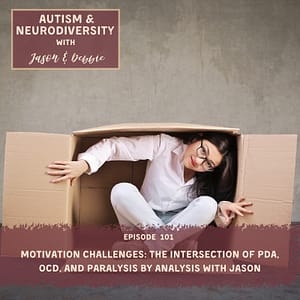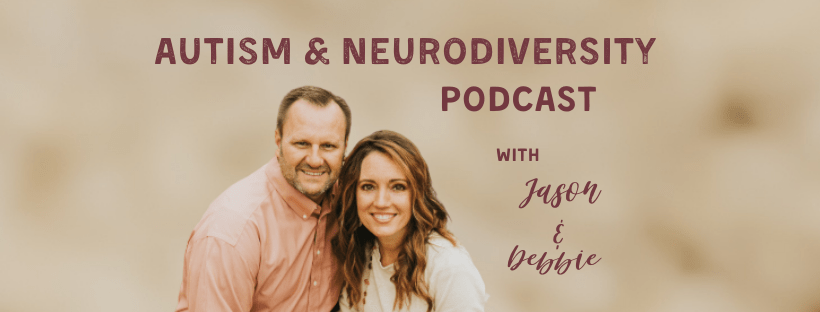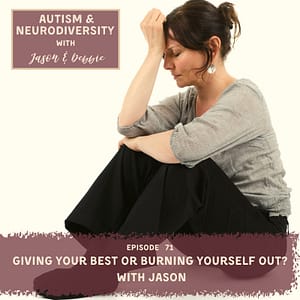[00:03] Jason: Welcome to the Autism and Neurodiversity podcast.
[00:06] Debbie: We’re here to bring you helpful information from leading experts and give you effective tools and support. I’m Jason Grygla, a licensed counselor and founder of Techie for Life, a specialized mentoring program for neurodiverse young adults.
[00:19] Jason: And I’m Debbie Grygla, a certified life coach. And maybe most importantly, we’re also parents to our own atypical Young Adults.
[00:30] Jason: I’m Jason Grygla. Welcome to the Autism and Neurodiversity podcast. I’m going to talk to you today about balance and avoiding burnout and some general theory, principles, experience, that I have seen and witnessed in myself and also in others that we work with.
So when we love our neurodivergent child, young adult, teen, client, student, and we want to give them the best, we don’t know where that line is between I’m giving them their best, and I am martyring myself for the cause.
And it would be very easy to burn ourselves out in the name of giving our loved one the most that we can give them. And I kind of remember learning over time that this is just a general rule, a principle, and a theory.
But I remember feeling like the first, probably 80% of success took up about half of my energy, time, resources, money, and that’s a lot compared to most kids. And then the next 10% of benefit that took us up to maybe 90%, took 10% for benefit, took 5% more of my energy, time, and resources.
So then I was about 75% of all my time, energy, motion, money, whatever I had to offer as a resource to get them up to that 90% mark. And then to get to 95%, it was another 20% of my time, energy, and resources.
And it seems like for us to give 100% of what we have to offer our children because we love them, and having that take away from our marriages, our own personal lives, our other children, our jobs, our communities, any of our hobbies, talents, interests, really took a lot of time and energy beyond what is normal.
And as a parent, I always struggle, and I think Debbie would agree, we’d struggle with how much should we give before we say we can’t give any more. And I think if we allow it, there would be a never ending thirst or need or time, energy. And I think our loved one would take everything that we had, and we would end up rained and exhausted. And if it sucked our life blood, then they would take it all if we let it. And it’s not that they’re selfish. It’s just that that’s the situation.
And so once we got to about 80% of benefit, we could probably maintain that pretty consistently and sustainably, because it took only about our time and energy.
On the other hand, we were always trying to do better. We always wanted to give them more. We felt like if we could just find the right program, the right therapist, the right medications, the right parental approach, and everything would work out.
And I remember feeling like Debbie and I biggest fights were largely about that last drop of benefit that we could give. And maybe that would be the one thing that would tip the scales into our child not being so hard and so difficult. And that’s just not realistic. It’s just not the way it works.
I wish someone would have stopped me or us and told us long ago that get them to 80% and be okay because one, you could kill yourself and you’d probably be willing to throw down your life.
And many of you have in many ways, and probably far too much or the amount that’s needed. I don’t know. I don’t know how to judge that for each of you in your individual situations.
But I do know that as parents, we would give all of it and we would run the race hoping to get them to a sustainable level or plateau, thinking that maybe once they turn 18, oh, that’ll be the magical number.
And then when that 18 comes and they’re still acting like they’re 14, 15 or less or more, that you still have more time than maybe if I can just get him to 21 and then maybe if I can just get him a job or maybe if I can just get them into college.
We’re always looking for that next magic moment that creates the relief that we need because we are sacrificing ourselves way too much. And one of the principles I want you to hear is that we’re in this for the long haul. Parenting doesn’t end.
And if our typical children or if our neurodivergent child, neuro-atypical child was typical, we would still be there for them in their crises and their ups and downs, which life is going to throw all of them.
And yet the proportion for the amount of time and energy and resources it takes to be there for a neurodivergent child or loved one or student is way higher than a neurotypical. And it’s not their fault. They don’t know. I think a large part of our motivation is to help them stay out of crises. We want them to be successful.
I think most of us were initially embarrassed by our child and their poor functioning, their poor performance, the fact that they couldn’t do this or couldn’t do that. And I don’t know how long it took many of you to get over that loss and grief that my child is never going to be the student body president.
But I think with many of our students or children, we see their strengths and we think, okay, they have this amazing strength. And we’ll judge them and their possibilities based on that strongest point, that they are just an amazing whatever it is that they’re amazing at, whether it’s art or music or math or engineering or memory and we tend to want to judge our kids in that way or do assessment.
I think that’s good if I’m judging. I really do want to judge them on their best aspects. But if I’m going to do honest assessment about functionality, I’m going to have to look at what are their weakest links. And even if they’re smart enough to memorize the entire law library, they’re never going to be able to function well enough to get through law school, for example.
So I guess I wanted to start with you being able to see that 80% is a good number, in my opinion. To shoot for more than that starts to take way more and more and more of your resources to get less and less back.
And I know parents and including myself that were willing to sacrifice way too much and then we were not able to sustain our love and activity and we burned out. I can’t even imagine doing it as a single parent and I know that many of you are doing that or even if you’re married and one of you in the marriage really just isn’t present or willing or capable of helping out. That’s hard. I get it.
And I also think that our neurodivergent loved ones are going to be very forgiving in the long run and I’m not exactly sure how much benefit they get versus don’t get. I just wonder sometimes if they would have just ended up in the same timeline whether we had done something for them or not. I think we point to performative milestones like I got them to graduate junior high or high school or I got them to get their driver’s license or whatever it is.
And those are good, those are important. I don’t have a problem with that. I just want you to understand this is a lifelong journey and I think for most of us we’re going to be parenting, which turns into mentoring hopefully sooner than later, for a lot longer than a normal parent child situation and relationship would be.
So slow down and take a breath, look at your situation and how much you are spending, your resources, the damage that you could do to your marriage, yourself and your other children is not worth sacrificing the other 50% of your time, energy and resources just to give your struggling child that’s going to be in crisis probably anyway, to give them a little bit better. Leg up.
As a matter of fact, a lot of neurodivergent young adults, when they get older, they look back and they realize that I was hard and I took away my parents quality of life. And right now that might seem crazy to you if you’re in the middle of the teen years or the young adult years and they’re not thinking of you at all.
But I don’t want them to look back and have the other siblings resent them and resent you because they were always in crises, and that’s not fair to them. So one, your quality of life comes first, and two, your marriage comes second. And three, all of your children come third.
That means you can’t sacrifice any of them for the others, and that doesn’t mean that they can’t take a hit. I think it’s fine if siblings of someone who is neurodivergent learn that some people just need more help and support, and that’s true with all kids. Some kids are easier than others, no matter what, and that’s okay.
So hit that 80% mark. Don’t let it turn into I’m just trying to get to that razor’s edge last two or 3% that I know is just going to make all the difference in the world, because it never happens. And that’s a pipe dream, and it sets you up for failure, and it sets you up for an unachievable goal that will make your life miserable, and then you won’t be there for any of your loved ones, including yourself.
Keep your relationship in place. A couple of thoughts on that. Every healthy, successful person I’ve ever met really does have their own way to refuel and replenish, and that includes talents, hobbies, interests, community service, art, sports, athletics, outdoors, whatever it is. You can always find time to implement that in your life. And if you don’t, you’re not helping yourself or your loved ones, and that specific situation is not worth sacrificing.
So take time for yourself, and that fills your cup, and you know where that balance is, and I don’t know where it is for you. And at the same time, it’s really easy to escape into some of those because they feel so good. And I think sometimes we all need to escape. As long as it’s not long term or you abandon your loved ones or your spouse to do all the work, then I think that’s great.
So those are my thoughts for today. Once you’ve given enough, the return on investment goes way down pretty quickly, and it’s just not worth it. So good luck balance your life, protect yourself better, and good luck parenting. And I want you there for the long haul because we all love our children and our spouses, and we should be loving ourselves. So I’ll talk to you next time. Thanks.
[13:07] Debbie: Thanks for joining us on this episode of Autism and Neurodiversity with Jason and Debbie. If you want to learn more about our work, come visit us at jasondebbie.com.




